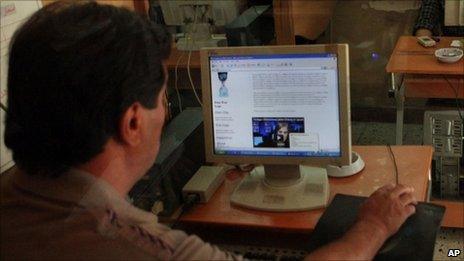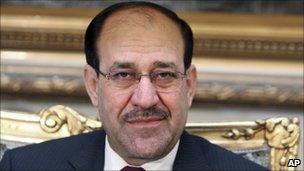Iraqis unimpressed by Wikileaks deluge
- Published

Many Iraqis said they found the content of the Wikileaks document release obvious
The Iraqi public did not seem to be unduly impressed by the Wikileaks deluge.
For many, its conclusions amounted to a statement of the obvious about a situation which they have been living and suffering for years.
But the affair has had a political impact, prompting a barbed statement from the office of Prime Minister Nouri Maliki implying that the venture was launched or was being exploited to undermine his position.
Many people on the streets of Baghdad had not been following the affair, and were surprised by the obviousness of its conclusions when they were explained.
"We have a prison scandal here every year," said one man.
"It's become normal here to be tortured in prison, to die in prison, or to disappear without trace in prison," he said.
The suggestion that the Americans knew about it was also seen as a no-brainer.
"Of course they knew about it, they're in control of everything," said one woman.
"And if they wanted to stop it, of course they could, for the same reason."
Mehdi alliance?
As for Mr Maliki, during whose period in office many of the abuses are alleged to have occurred, one Baghdad resident had this to say:
"Maliki was against the militias, he put them in jail and tortured them. But now he's letting them all go, to get support from the Sadrist movement."
That was a reference to Mr Maliki's campaign against the Mehdi Army militia in 2008, and rumours that his recent alliance with its leader, the radical young cleric Moqtada Sadr, involved the freeing of jailed Mehdi militants.
The prime minister himself seems to have been stung by the Wikileaks releases, especially the suggestion - promoted mainly by news outlet Al Jazeera, external - that armed units under his control may have been involved in death squad activities during the worst of the sectarian carnage in 2006-7.
Mr Maliki's office issued a statement which ignored the broader allegations of widespread torture and abuse in official detention centres, but angrily rebutted suggestions that forces under his control acted as death squads.
It said that as prime minister and commander-in-chief of the armed forces he had entire security organs under his control, but they operated only under the law and not out of sectarian or party considerations.
The statement dismissed the Wikileaks outpourings as "media games and bubbles motivated by known political goals".
Earlier, a government spokesman admitted that "violations" had taken place but that these did not reflect official policy and were punished when discovered However, there is no record of any official having been jailed for torture after successive scandals starting in 2005.
Political world record
It is Mr Maliki's grip on the levers of security power that is one of the major bones of contention in the protracted struggle with his main rival, Iyad Allawi, over the formation of a new government.

Mr Maliki's government dismissed the Wikileaks release as politically motivated
The spokesperson for Mr Allawi's Iraqiyya coalition, Maisoon Damluji, said that the reports of widespread abuses underlined the dangers of allowing too much power to be exercised by one person.
Mr Allawi is demanding a 50-50 division of power as the price for joining a government including Mr Maliki, and clearly hopes the Wikileaks affair might strengthen his hand.
Most of the victims of detainee abuse are believed to have been from the Sunni community, in which the insurgency was based, and which largely backed Mr Allawi in the March elections.
The Wikileaks affair seems to have further envenomed the political situation, making rapid movement towards a new government even less likely.
Iraq is already three weeks beyond the previous world record for the length of time taken between elections and the formation of a new government.